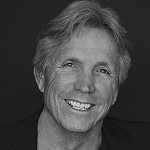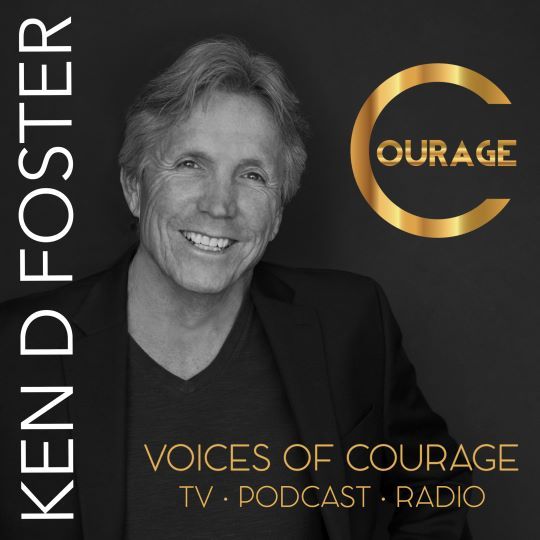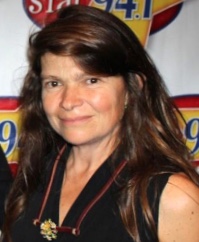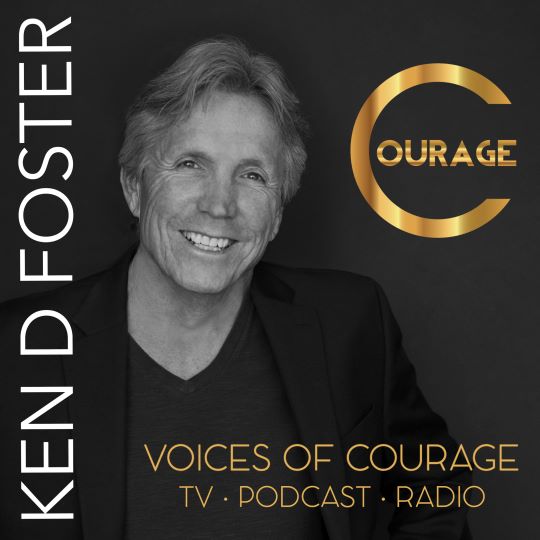Voices of Courage, July 7, 2019
Voices of Courage with Ken D Foster
THE COURAGE TO LIVE LIFE IN FULL EXPRESSION
Guests, Alessandra Deerinck and Jim Phillips
Guest #1: Alessandra Derrnick
Italian born, Alessandra, was a horsewoman first, before making her mark as a daring and adventuresome jockey, riding flat races in Italy during the 1980s and 90’s. She went on to graduate from the Veterinary Medicine School at the University of Milan. Today, She trains horses and teaches horsemanship using her own approach, a system that is rooted in the classical dressage training, current horse behavioral sciences and her experience of forty years spent with horses.
Even before she moved to the US, she was writing widely praised, freelance articles for equestrian publications.
Currently, she writes regularly in the showing and training section for Elite Equestrian.
Since 1996, she has lived in California with her family, where she established Human Horse Sensing. After having established herself as a trainer and horsemanship clinician, Alessandra has presented her work at CavalliaMilano 2010, Equine Affaire Pomona in 2011, Norco Horse Affaire in 2017.
Guest #2 Jim Phillips
Jim Phillips is a LIFE Strategist, author, speaker and business coach. For over 30 years he has been inspiring others to higher levels of achievement and understanding through his strategy sessions, coaching, writing and presentations. One of Jim’s gifts is his ability to help others understand and apply complex spiritual concepts to their personal life which has resulted in their creating and experiencing more of who they truly are and what they desire from life.
Jim has written two books, “The Key to LIFE; living in full expression”, published by Sacred Stories Publishing and “From Inspiration to Intention”, that was self-published.
Jim is also a featured expert in the just released inspirational, transformational movie, “Becoming the Keys”, written and produced by award winning film producer Robin Jay. The movie also stars such notables as don Miguel Ruiz (The Four Agreements), Dr. Joe Vitale (The Secret) and Dannion Brinkley (Saved by the Light).
Jim believes there has never been a time in the history of humanity when there was a greater need to understand who we are and why we are here. Never has there been a time in the history of humanity when there have been more people open and receptive to this message.
Jim currently resides in Aldie, VA where he continues his writing, coaching and speaking.
-------------------
THE COURAGE TO LIVE LIFE IN FULL EXPRESSION
In our daily lives we continuously run from one thing to the next. Because of this running many times we do not take the time to stop and look deeply into our life. But in order to understand what is happening when we fail or succeed, it is imperative to take time to reflect, plan and notice what is working and what is not. This is the way to Live a Life of Full Expression. Hi this is Ken D Foster your host.
Your personal and professional life will get better and better if you make the decision right now that you are going to be the success that you have longed for. Right now, in this moment, you are capable of exponential growth. You can multiply your personal effectiveness, hit new highs, create wealth and unending health. The results you can achieve may be hard for you to imagine, but if you are thorough with this program, you will have a breakthrough experience and enjoy success on a different plane.
How do I know this….. Coaching for a couple decades and have seen so many of my clients breakthrough barriers, many times they didn’t know they had, but they knew something was off because they were not getting the results they wanted. Story: I remember the day I decided to write my first book……
Point, you can do anything when you decide that no matter what you are going to accomplish the goals you set.
All success or failure starts with the beliefs you hold and the thoughts you constantly focus on. Because all things are created at the level of mind first, right now, you can let go of thinking that things will change gradually or incrementally. Change can occur rapidly, when you are focused on the right outcomes with the right mindset. So, what has to happen for you to make some quick changes?
I can tell you this, when you tap into your Wisdom-Self or Superconscious mind, anything is possible.
When you tap into your naturally successful self, things will improve quickly and dramatically. You will feel a new sense of confidence, clarity of direction and be in control on any situation.
If you are like most, you haven’t come close to reaching your potential. In fact, you probably don’t really know what you latent potential is. You have hardly scratched the surface of what you can personally achieve. But maybe the time has come to change that!
Summer is upon us and yesterday I was watching the hummingbirds in my backyard. I have been experimenting with the food I am giving them, and have found they are very discerning. They will only go to the feeder after the scout bird has checked it out. If the scout doesn’t approve the food, it will shoo the other birds away. Point, be like the hummingbirds and use full discretion in your life if you want to fully express yourself.
--------------
Talking Points Guest #1: Alessandra Derrnick
Sensing between man and horse.
All individuals use their senses to relate with others and their surroundings. Keeping it in mind will make our horsemanship better.
Traditionally, the interaction between man and horse happens through training by conditioning horses to respond to certain stimuli, which puts stiff boundaries to horsemanship. In a natural herd of horses relationships and ranking are based on “grazing rights” and territory, while in horsemanship many are still trying to achieve leadership with human conventions and force.
Have you ever thought about being able to communicate with a horse spontaneously through a dynamic dialogue that you can instantly manage like a social relationship instead of training?
Human Horse Sensing Horsemanship is a way to do so!
The senses are everyone’s open window on the environment. Different stimuli reach individuals through specific receptors located in the sense organs. The horse’s head, as well as the human head, is the anatomical site of all the senses, the rest of the body is able to perceive through the sense of touch. Based on what is perceived, and with the filter of the personality, everyone performs behavior, expressing thoughts and relating to others, who will perceive and will respond alike. Some information, for example the stimuli that cause instinctive behavior are more immediate in eliciting responses while other stimuli use more complex neural paths.
Human Horse Sensing is a system that manages the relationship, in the interactions amongst human beings and horses, and allows for an efficient communication. A relationship goes beyond the circumstances of an action we do when working with horses, and gets transferred from one situation to another, even between very different ones. Horsemanship is at the core of any equestrian situation, jumping, dressage, fox hunting or any other thing we do with horses.
Human Horse Sensing establishes a communication between humans and horses where every moment of our interaction is managed spontaneously in a purposeful manner, going beyond the stiff boundaries of traditional training. The interaction between human and equine is always done through behavior, but we do it with attention to the details of communication. The result we obtain is a spontaneous interaction effective from the first moment and that does not depend on trained actions, or on the level of experience of the human or equine individuals involved.
It can be established on the ground or in the saddle, whether it is our horse, or one that we do not know. A horse never signs a contract of employment with us, his attitude can change with the circumstances and our relationship must be managed in a dynamic and always effective way.
The communication of Human Horse Sensing is not made by attempts and repetitions of which you want to see the outcome, but has an immediate meaning for man and horse. Each individual's behavior reaches another through the senses. The main elements that are modulated in the actions are space and movement concerning concepts that are values with a social background, common to man and horse.
In these terms the interaction results in a real dialogue. Human Horse Sensing always creates the voluntary interest of the horse in the desired action. This element is usually ignored or even opposed to the situation that other methods aim at creating, where for the horse the motivation is often to avoid a condition of discomfort appropriately prepared by the human being.
The structure that can be given to the relationship with the horse, using Human Horse Sensing, keeps alive the correct communication, always leaving out punishment, fear or pain from the interaction between man and horse. The reasons for this choice are dictated by the knowledge of what punishment, fear and pain produce in the process of learning where their effects encroach on the territory of so-called survival, where actions can become unconscious, sometimes unmanageable, or even dangerous.
The spontaneous communication between man and horse, which has traditionally been little explored, or even considered useless, can actually be vital when the horse-man combination experience situations not covered by training and therefore unexpected, difficult or dangerous.
Human Horse Sensing Horsemanship can be learned traditionally and online, and is the subject of a book by Alessandra Deerinck, where this new way of being with horses is described from the basics of behavior, the process of learning, working with horses free to move, the elements of the communication and of the social relationship between human and horse.
Facts about Human to Horses Sensing
Just like us human beings, horses have their five senses: sight, hearing, feel, smell and taste. Normally, even in the interactions with other domestic species, human beings choose to use language, the most immediate vehicle of information for us, while in order to respond to it the animals have to learn the meaning of our verbal cues by being trained. Knowing how to approach a horse, staying in social contexts, familiar for the horses (like reciprocal presence, position, movement and primary needs) can really help us in communicating efficiently with them. Working with horses without holding them allows, requires and teaches how to modulate the communication through the senses. This is a spontaneous kind of communication, which eliminates the need for horses to have to learn how to respond to cues, widening the possibilities for communication.
There are some important differences, between how human beings and horses use the senses. In this setting, we are not going to cover the subject in a comprehensive manner as we do in our courses, but just to mention some useful tips on how to best get our information to horses in a spontaneous and direct way.
Sight
The horse has a wider field of vision, due to the position of the eyes on the individual’s head, and has the ability to efficiently employ a monocular mode, and a binocular mode. Horses will primarily use body language and the sense of sight, to communicate in a detailed fashion with other individuals, while man uses sound and the sense of hearing, to get detailed information across to others.
The sense of sight is paramount, when working with a horse without tack; furthermore, it is our best connection to him. If a horse is looking at something, he is also paying attention to it.
Hearing
The sounds that horses can articulate are very simple, but they can definitely control the intensity, and rhythm of sounds, when they “talk” with their keen. When working with horses the intensity, and rhythm of a sound matter more than the meaning of the words we use, because the horse understands immediately the intensity and rhythm of the sounds we make.
The equine ear can passively catch sounds, and has a very pronounced ability to move, which helps horses in localizing the source of the sound. In addition to this, the position of the horse’s ears can express their state of mind, giving them the ability to express their personality and mood in a certain situation.
When communicating with a horse, that is able to freely express himself because not tied to a rope, it is essential to pay attention to the appearance of the horse’s ear in detail.
Touch
In horsemanship, the sense of touch becomes the primary channel of communication when we ride, given that the horse cannot see us because of our position. In other situations horses use the touch to explore things that look safe enough to approach closely, action that they carry out after having blown on the object to explore it. Timid horses stretch their necks to touch something with the tip of their nose. This part of the horse’s head is very capable of collecting detailed information; it also helps in the selection of food.
Through touch, a horse perceives, in a very detailed way, things that are as subtle as the weight of a fly on their skin. When we rely on touch to communicate with horses we need to very finely gage our cues, because the horse can be that aware.
Smell and Taste
Horses always use smell and taste when they are far or close to the source of the information, but most of the time human beings do not keep in mind the information they can convey to a horse through it.
We feel that these last two senses require from us more consideration than what normally is given. In our courses we cover the subject of smell and taste, and to the use of food in horsemanship highlighting its effectiveness as a communication tool.
--------------
Talking Points Guest #2 Jim Phillips
Interview questions/key talking points for Jim Phillips, author of The Key to LIFE, Living In Full Expression.
1. The title of your book is, The Key to Life, Living In Full Expression. What does it mean to live in full expression?
2. What was the turning point in your life that inspired you to want to share your understanding and knowledge with others?
3. Why was your book, The Key to LIFE, Living In Full Expression written?
4. What was the inspiration behind your writing the book?
5. What is it that you intend for the readers to gain by reading your book?
6. What is one key point you want to share with our listeners?
7. Who would be drawn to the message in your book? For whom was the book written?
8. What impact do you hope the book has on others?
9. How are you living in full expression and how do you plan to continue living in full expression as you move on in your life?
10. Your book contains many phrases or quotes, which one to you is the most powerful or inspiring?
11. How did you come up with the title?
12. What books have most influenced your life?
13. If you had to choose, which writer would you consider a mentor?
14. Is there anything you found particularly challenging in your writing? What was the hardest part of writing your book?
15. What were the challenges (research, literary, psychological, and logistical) in bringing it to life?
16. Did you learn anything from writing your book and if so, what was it?
17. You are also a featured expert in the newly released movie, Becoming the Keys,” what is the overall message of the movie and what was your role?
Voices of Courage

Support my show
$2.99/mo or $5.99/mo or $9.99/mo
Click HERE
SUBSCRIBE TO TALK SHOW
Ken D Fosters Voices of Courage Radio – Podcast – TV Show is Making a Difference by Inspiring and Igniting the Dreams of our Listeners to Grow their Businesses and Lives by Knowing the Unknowable, Seeing the Unseeable and Doing the Impossible.
HOW WE DO IT
We bring Wise Guests on the Voices of Courage Shows who Empower
our Listeners to Expand their Consciousness, Realize Who they Truly
Are, in Order to Fulfill their Noble Goals. We also Deliver to our
Insider Members, Books, Special Guest Interviews,
and Programs Designed to Fulfill our Mission.
Key Word Categories:
Personal Development
Self Improvement
Effective Communication
Relationship Building
Inspirational Messages
Holistic Living
Business Development
Philosophy of Wisdom
Psychology of Success
Spiritual Evolution
Brilliant Future
Personal Empowerment










